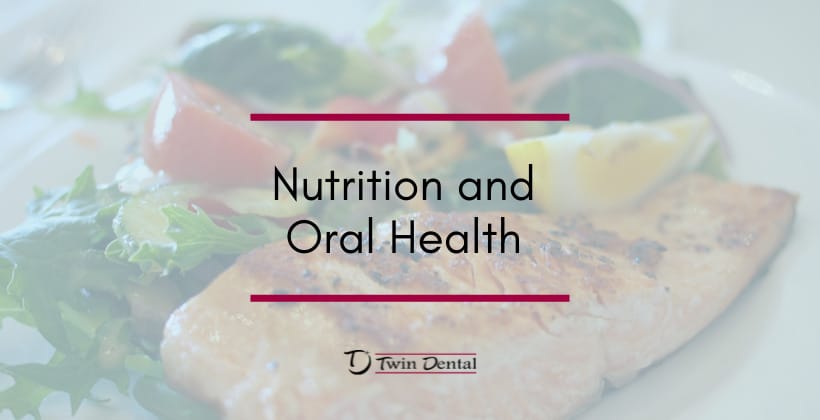Is there a link between nutrition and oral health?
Nutrition information – it’s all around us. From how many fruits and vegetables we should eat, to the salt we should avoid, to the sugar intake we should decrease. We know these are all healthy steps we should take to improve our overall health and wellness.
What we might not hear as much about is the link between the foods and beverages we consume and our dental health
Did you know:
- Consuming enough water can decrease the risk of tooth decay
- Sticky foods can be some of the worst for our teeth
- Consuming dry foods can have a link to dental health
- High acid foods can linger on the teeth causing problems
- Drinking your calories can be detrimental
- Dairy foods can help dental health
- The top five sources of sugar in the diet are: (1) soft drinks/sports drinks/energy drinks (2) cakes/pies (3) fruit drinks, (4) Ice cream (5) candy
Why are these items impactful?
Water – A moist mouth increases saliva production. Saliva helps carry beneficial minerals to teeth and removes acid. Adequate water and a moist mouth are some of the best oral protective measures and saliva is helpful in re-mineralizing enamel.
Sticky foods trap bacteria and sugar on the teeth. Bacteria feed on the sugar turning it into acid. This acid then begins to break down tooth enamel causing demineralization. Saliva helps to stop this process.
High sugar in the diet – provides a food source for bacteria resulting in more acid on the teeth
Drinks high in sugar stick to the teeth again providing a food source for bacteria
Dairy foods are high in calcium and Vitamin D. These are important in keeping teeth strong
The top four dental protective factors are:
- Diet
- Saliva
- Fluoride
- Oral Hygiene
Given all of this here is a list of what to do more of and what to have less of:
DO MORE:
- Increase water intake – a moist mouth harbors fewer bacteria than a dry mouth
- Use and drink tap water – the fluoride and other minerals help strengthen teeth
- Choose cheese, vegetables, fruits, and nuts as between-meal snacks
- Have three dairy items daily (cheese, milk, yogurt, etc.)
- Have coffee or unsweetened tea instead of sugary drinks
- Brush your teeth at least twice a day for two minutes at minimum, each time. Your teeth need to be exposed to fluoride to increase effectiveness.
- Increase your fruit and vegetable intake – these can help clean your teeth naturally
- Have more seafood – this is a natural source of fluoride and other minerals
- Increase the number of times you chew each bite of food. Chewing stimulates saliva.
- If eating sticky foods have them with a meal
- Use a straw to drink beverages. This can help minimize the tooth’s exposure to sugar
- Chew gum made with Xylitol (Trident, Zyla, BioGenesis, Zellie, Zapp and Spry brans have xylitol). This helps decrease acid on the teeth.
HAVE LESS:
- Sticky candy, gummies, taffy, mints, caramels
- Figs, dates, and raisins by themselves
- Decrease sports drinks with full sugar
- Decrease regular soda and sugary drinks – they bathe the teeth in sugar and are often consumed at a time that does not coincide with brushing
- Avoid citrus foods (high in acid) – oranges, lemons, limes unless as part of a meal
- Don’t chew ice
- Decrease Phosphoric acid, malic acid
- Limit added sugars
- Have fewer sauces, creams, cakes, pies, candy, custards, honey, molasses, jams/jellies, beer
- Decrease between-meal snacks – food/beverage snack choices are typically high in sugar or acid and remain on the teeth after the snack is consumed
- Avoid bad breath – this is often a sign of a very dry mouth
- Avoid specialty coffee drinks high in sugar
Additionally, there is increasing evidence that poor oral care can be a contributor to diabetes, autoimmune disorders, and cardiovascular disease.
Bottom Line: Help your teeth maintain optimal health by paying attention to oral hygiene and your diet!
Article provided by Diane Dew, RD, LC, CSC, FAND ([email protected])
Resources:
Mouthhealthy.org
Academy of Nutrition and Dietetics, “Healthy Nutrition for Healthy Teeth”, 7/11/18
Position of the Academy of Nutrition and Dietetics: Oral Health and Nutrition
Connection Between Food, Oral Health “Strong” – Colgate.com


